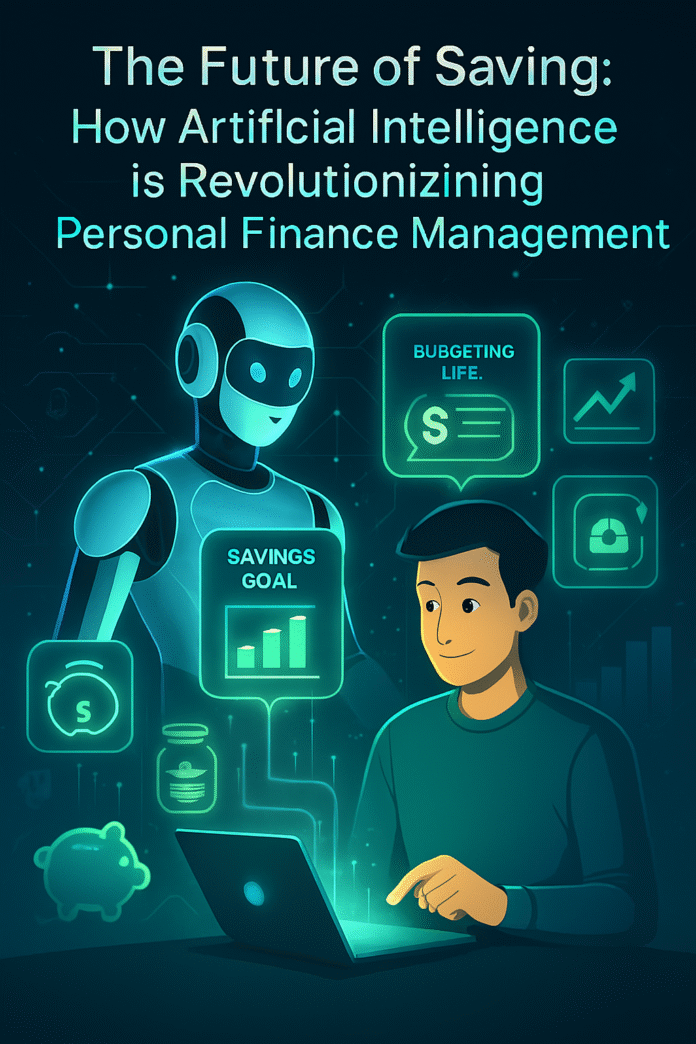In today’s fast-paced digital world, the way we handle money is changing a lot. People used to do all of their math by hand, write down their bills, and use paper spreadsheets. Instead, AI is coming in to shake things up and make it easier to manage your money, from budgeting and saving to investing and keeping an eye on your credit. AI in personal finance isn’t just a fad; it’s a revolution that will help you make better choices, save more money, and worry less about money.
Imagine a world where your financial advisor isn’t a person at a desk but an AI-powered tool that looks at your spending, predicts your future costs, automatically rebalances your investments, and gives you personalized advice—all in real time. This idea of the future is already coming true. Anyone who wants to be sure their financial future is safe needs to use AI savings tools. Some of these tools are AI budgeting apps that help you find things you don’t need to buy and robo-advisors that manage investment portfolios with amazing accuracy.
This complete guide will show you how AI-powered tools are changing how people handle their money. We’ll talk about the main AI technologies that power modern financial apps, how they help people save and budget better, and how these new technologies are changing the way people invest and manage their credit. We’ll also talk about the ethical and moral issues that AI could bring up in finance, such as privacy concerns with data and the risks of relying too much on algorithms. Lastly, we’ll give you useful advice and things you can do to use AI-powered financial tools safely.
This article will teach you everything you need to know about using AI to its fullest potential, whether you’re a tech-savvy millennial, a Gen Z beginner, or just interested in the future of personal finance technology. Let’s look at how AI can change the way we manage our money and how you can also use a smarter way to save, budget, and invest.
What Does AI Mean in Personal Finance?
The simplest way to think of artificial intelligence is as machines that can learn and copy how people make decisions to act like humans. AI in personal finance uses a number of technologies, like machine learning algorithms, natural language processing (NLP), and predictive analytics, to look at your financial data, find patterns, and come up with useful plans. But what does AI really mean when it comes to taking care of your own money?
What Is AI in Finance?
- Learning Machines (ML): ML algorithms use information about people’s past spending and saving patterns to make predictions about how much they will spend and save in the future, as well as how the market will move. For instance, ML can look at how much you’ve spent in the past to guess what bills or types of spending you’ll have in the future.
- Processing Language Naturally (NLP): NLP is what makes chatbots and virtual assistants that help you with your money work. These tools understand what you’re asking and give you advice right away, which makes it easier to use your budgeting apps.
- Predictive Analytics: This technology uses statistical models and methods for making predictions to guess what will happen to your money in the future, such as when you might run out of cash or find a way to save money. This helps you make plans.
Old-Fashioned Ways vs. AI-Powered Personal Finance Tools
AI-powered tools change and learn over time, but traditional budgeting or banking apps only work with fixed user inputs and need to be updated by hand. They can do these things by themselves:
- Sort Expenses: Automatically put transactions into the right groups, which saves you time.
- Detect Anomalies: Find strange spending patterns or possible fraud right away.
- Offer Personalized Advice: Make suggestions that are in line with your habits, goals, and spending patterns.
Traditional tools usually give you a one-size-fits-all answer, but AI-driven solutions change their output to fit your specific financial situation. This difference is very important because it means that AI in personal finance not only makes things easier, but it also gives users the tools they need to make better, more strategic choices about their money.
How AI Is Helping You Save Money and Make a Budget
AI can help people save and budget better, which is one of the best things about it in personal finance. AI-powered budgeting apps look at how you spend money, find patterns, and give you personalized advice on how to save more money. Let’s break this down into steps.
Watching How People Use Their Money
AI can look at months or even years of transaction data to help you understand how you spend your money. This analysis is useful in many ways:
- Sorting by itself: AI-powered apps, for instance, automatically put your expenses into groups like groceries, utilities, entertainment, and eating out, so you don’t have to do it yourself.
- Spending Patterns: By looking for patterns, these tools can tell you when you’re spending more than usual in a certain area. For example, if your dining costs go up a lot in one month, an alert can tell you to change your budget.
- Guessing Costs in the Future: AI uses predictive analytics to make educated guesses about what costs will be based on what has happened in the past. This helps you plan ahead and use your money better.
Personalized Help with Budgeting
Many personal finance apps now have AI-powered budgeting tools. These virtual guides give you personalized tips on how to handle your money better:
- Suggestions that are just for you: AI can help you make realistic monthly budgets based on how much money you make, how much you spend, and what your financial goals are. It can also change them on its own when your situation changes.
- Nudges for behavior: AI uses behavioral science to help you make better financial decisions. For example, it might gently tell you to stop buying things you don’t need and save that money instead.
- Real-Time Insights: You can change how you spend money right away with instant feedback, which helps you stick to your budget.
Things That Happen in Real Life
For example, think of an app like Emma or Cleo. These apps use machine learning to look at your transaction history and give you personalized advice, like reminding you to cancel subscriptions you don’t use or suggesting cheaper options for regular expenses. People say that these kinds of tips have helped them save hundreds of dollars a year without making big changes to their lives.
An AI Budgeting App That Automatically Saves Money
Sarah was a young professional who had trouble sticking to her budget. Using an AI-powered budgeting app, Sarah learned that she was spending a lot of money on coffee every day. The app not only helped her keep track of her spending, but it also told her to set aside a small amount of money each week for a “coffee fund” to help her keep track of these costs and maybe even lower them. Sarah changed her habits over time, stopped going to the coffee shop for no reason, and put that money into her savings account. This shows how AI can help you save a lot of money by giving you useful information.
Benefits of Using AI to Help You Budget and Save
- Less work to do by hand: You don’t have to enter or check data by hand anymore; the computer does it all for you.
- A better understanding of money: Detailed information helps you understand where your money goes.
- Higher Rates of Savings: AI helps you find ways to spend less money so you can save more, which will grow over time.
- Change in Behavior: People can spend their money better when they get gentle nudges and personalized advice.
AI is changing how we save and budget by making these tasks faster, easier, and more tailored to our needs. When you use AI to help you with your money, you don’t have to guess what to do. Instead, you can make smart choices.
AI in Managing Wealth and Investing Automatically
AI is changing how people manage their money and build their wealth in big ways, not just by making budgets and saving money. Investors are using robo-advisors more and more these days. These are AI-powered platforms that manage investment portfolios.
What Do Robo-Advisors Do?
Robo-advisors are digital platforms that use AI algorithms to provide automated, algorithm-driven financial planning services with little or no human oversight. These tools use advanced machine learning and risk assessment models to create personalized investment plans based on your risk tolerance, financial goals, and the amount of time you plan to invest.
AI’s Important Benefits for Investing
- Rebalancing your portfolio: AI watches your investment portfolio all the time and makes changes to it to keep the asset allocation you want. This means that if the market changes, your portfolio will automatically change to help you reach your goals.
- Tax-Loss Harvesting: Some robo-advisors use algorithms to find and take advantage of tax-loss harvesting opportunities. This can lower your tax bill and raise your net return.
- Keeping Costs Down: Robo-advisors usually charge a lot less than traditional financial advisors because their operating costs are lower. This means you can put more money into investments.
- Personalized advice: AI-powered platforms can give you personalized advice and new investment opportunities based on how your portfolio is doing and how the market is changing.
AI-Managed Portfolio Is an Example from Real Life.
For instance, John decided to use a robo-advisor platform to invest. After John answered a few simple questions about how much risk he was willing to take and what his financial goals were, his portfolio was made automatically. The AI watched the market all the time, rebalancing his portfolio and even using tax-loss harvesting strategies when the market went down. This method helped John see his portfolio grow more smoothly while keeping costs low. It shows how AI can help people manage their money.
Possible Drawbacks
There are a lot of good things about AI-powered investment tools, but there are also some risks that need to be thought about:
- Relying on Algorithms: You might not be able to make good decisions in important, complicated situations that need more thought if you rely too much on AI.
- Changes in the Market: AI models choose based on data from the past, which may not always be right when it comes to predicting new market events.
- No Personal Touch: Some investors might think that an algorithm-only approach doesn’t have the same level of understanding and personal touch as a human financial advisor.
How to Get the Most from Robo-Advisors
- Don’t put all your money in one place: Even if you use a robo-advisor, you should make sure that your portfolio is well-diversified to lower risks.
- Stay Up to Date: AI does the routine rebalancing, but you should still keep an eye on market trends so you can step in if you need to.
- Make Your Goals Clear: If you want the AI model to help you plan your investments in a way that helps you reach your financial goals, be sure to write them down clearly.
Using AI to handle investments is a big step forward in how people handle their money. Robo-advisors help people make decisions that are as smart and quick as those of wealthy investors or people who can pay for a financial advisor.
AI and Credit Management
Credit is a big part of managing your money because it can change things like the interest rates on loans and the approval process for mortgages. AI is now helping people keep an eye on and improve their credit scores, avoid scams, and better manage their debt. This is a good thing.
How AI Keeps an Eye on Credit Scores
AI-powered systems can always check your credit history and spending habits to see if you are a good credit risk. These algorithms can do these things:
- Watching for changes in how people use credit: AI tools watch for changes, such as more credit use or late payments, and let you know if there might be a problem.
- How to Find Fraud: Advanced machine learning models can quickly flag unusual activity on your credit accounts, which helps you stop fake transactions right away.
- How to Build Credit: AI can look at how you spend and pay back money and give you specific advice on how to raise your credit score, such as lowering your credit card balances or getting more types of credit.
Things That Can Help You Get Out of Debt
You can also use AI-powered platforms to help you figure out the best way to pay off your debts. For example, they can tell you the best way to pay off your loans based on your financial situation, like the snowball or avalanche methods. These tips are made just for you so that you can pay off your debt in the best way possible.
Using AI to Manage Credit in the Real World
Lisa had a lot of trouble with credit card debt with high interest rates. Lisa used an AI-based credit management tool to get personalized advice on how to combine her high-interest debt and change the way she spends money. The tool told her when her credit use was too high and even suggested setting up automatic payments so she wouldn’t miss any due dates. Lisa’s credit score went up a lot over the course of a year. This made it more likely that she would get better loan terms and pay less interest overall.
Benefits of Using AI to Handle Credit
- Better alerts and monitoring: Real-time alerts help keep your credit score in good shape.
- Credit Tips Just for You: Getting personalized advice can help you handle your debt better.
- More safety: AI can help you find and stop fraud, which keeps your credit profile safe.
In short, AI in credit management helps you keep an eye on your credit health, stay out of trouble with high fees, and improve your overall financial health with little to no work on your part.
What AI Chatbots and Virtual Financial Advisors Can Do for You
AI chatbots and virtual financial advisors are becoming more and more common. They are changing how we get help and advice about money. People can get personalized help at any time, even when the office is closed, because these tools are available all the time.
What Do AI Chatbots Do?
Natural language processing (NLP) is what AI chatbots use to understand and respond to questions from users. They can help you with your personal finances in the following ways:
- Answer Questions: Give quick answers to questions about how to budget, pay bills, or invest.
- Offer advice on how to save: Based on how you spend your money, give you ideas for ways to save more money and cut costs.
- Help with Transactions: Help you set up automatic payments or transfers for your bills.
Virtual Money Guides
Virtual financial advisors go above and beyond by offering full financial planning:
- Help all the time: They make sure you can get help from an expert whenever you need it.
- Customized Financial Plans: By looking at your financial information, these virtual advisors can help you save money and make a budget.
- Using AI tools: Many virtual advisors work with other AI-powered platforms to create a system for managing money that works well.
Benefits for the Many
AI advisors help people get professional financial advice more easily, especially those who can’t afford or don’t have access to regular financial planners. They offer financial advice to everyone by:
- Options that are easy on the wallet: Costs are lower than those of human advisors.
- Giving people power by giving them information: Advice that is clear and fits with your past financial decisions and goals.
Examples and How to Use
Many fintech companies now have virtual advisors that use AI. For example:
- Cleo: A chatbot that uses AI to help you understand your spending, set savings goals, and keep you motivated with fun game-like features.
- KAI from Kasisto: Some banks use KAI to run their virtual assistants. KAI helps with everyday transactions and gives you financial advice in real time.
AI chatbots and virtual financial advisors are now a part of your daily banking and budgeting, giving you access to financial advice around the clock.
New Ideas for AI and Personal Finance in the Future
AI in personal finance is still in its early stages of development. New trends show that managing money in everyday life is becoming even more closely linked to artificial intelligence. Take a look at what the future might hold.
Predictive Savings and Real-Time Scoring of Your Financial Health
In the future, AI could be used for:
- Models for Predictive Savings: Tools that not only show you how much you’ve spent in the past, but also guess how much you can save in the future and automatically change your contributions to get the best results.
- Real-time scores for your financial health: Think about getting real-time updates on the state of your finances based on how you spend, save, and invest your money. It works like a credit score for all of your money.
Using IoT and Wearable Technology
As the Internet of Things (IoT) gets bigger, AI could work with wearable tech to:
- Watch your spending in real time: Smart devices can automatically organize your purchases as you make them.
- Send alerts right away: Set up alerts on your fitness band or smartwatch to let you know when you’ve gone over your budget or missed your savings goals.
The Joining of Blockchain and AI
Blockchain technology could lead to:
- More safety: Records of all transactions that are clear and can’t be changed. This makes people trust automated systems more.
- Decentralized Finance (DeFi): Thanks to safe, decentralized networks, AI-powered DeFi platforms could change how we invest, manage loans, and even pay our bills.
Financial Coaching That Is Made Just for You
In the future, AI systems might be able to give you very personalized financial advice by linking to all parts of your financial life, such as your bank accounts, investment portfolios, spending habits, and life goals. With this all-encompassing approach, it would be possible for:
- Personalized financial plans: Advice that changes based on what’s going on in your life.
- Analysis of feelings: Some people who come up with new ideas are working on tools that can help you deal with stress and urges by tracking how you spend your money and giving you mindfulness and coaching.
The future of personal finance technology is very bright. AI will soon make it easier, more personalized, and more effective to handle your money.
Problems and Ethical Questions
There are problems and moral issues that come up when using AI in personal finance, just like with any new technology.
Data Privacy and Security
- Personal Information: AI systems deal with a lot of private and financial data. It is very important to keep this information safe.
- Risks of Breach: AI platforms spend a lot of money on security, but they are still worried about data breaches. Users should know how to use the tools they do and choose ones with good security.
Algorithms’ Bias and Accuracy
- Making choices with bias: If AI algorithms aren’t set up right, they can show biases that are already in the data. This could lead to bad financial advice.
- Too Much Reliance on Automation: Following AI’s advice without thinking for yourself can be risky, especially when the market is unstable.
Users Have Both Openness and Control.
- AI that can be explained: Users should understand how the algorithms work and why they make the decisions they do. AI calculations need to be open and honest in order to gain trust.
- The government keeps an eye on: Slowly, governments and regulatory bodies are coming up with rules to make sure that AI tools for personal finance are fair, accountable, and open.
Using AI in a Way That Is Right
- Striking a balance between privacy and productivity: Using AI’s power while still keeping people’s privacy safe is the hard part. Users should always be able to choose how their data is shared and used.
- Consent that is based on knowledge: Banks and other financial institutions need to make sure that users understand what it means to use AI-driven tools and give their full permission for their data to be used.
AI can help with personal finance in a lot of ways, but these problems show how important it is to keep making security, ethical, and regulatory measures better.
How to Safely Use AI Tools to Save and Manage Money
It’s important to use these tools safely because AI has a lot of potential and a lot of problems. Here are some helpful tips for picking and using AI-powered apps to help you keep track of your money:
How to Pick AI-Powered Apps That You Can Trust
- Reviews and Research: Look for platforms that have good reviews and easy-to-understand security rules. Many well-known fintech companies have strict rules that they follow.
- Keeping Data Safe: Check that the app follows privacy rules, uses encryption, and requires two-factor authentication.
- User control: Choose services that let you change or ignore AI suggestions if you want to.
How to Use AI Suggestions the Right Way
- Stay up to date on the news: Don’t just do what AI tells you to do; know why it’s telling you to do it. Don’t see them as orders; see them as suggestions.
- Check on it often: Check your accounts and financial statements often to make sure that the choices machines make are in line with what you want to do.
- Keep it personal: When making complicated financial decisions, use AI insights along with your own judgment or talk to a human advisor every so often.
How to Keep Your Personal Information Safe
- Keep your software up to date: Always make sure that your apps and devices have the latest security patches installed.
- Networks that are safe: Avoid using public Wi-Fi whenever you can, and only use secure networks to access financial sites.
- Find out: Stay up to date on the latest personal finance cybersecurity trends and the best ways to protect your information.
You can lower your risks and get more out of AI by following these steps and staying involved with your digital financial tools.
Frequently Asked Questions
Do AI tools help you save money or make smart investments?
There is no AI tool that can guarantee that you will be financially successful because the markets and your own finances are always changing. But AI-powered tools can help you manage your money much better by giving you personalized advice, cutting down on mistakes, and automating tasks that you do every day.
Are AI-powered personal finance apps good for people who are new to them?
Yes, for sure. Many AI personal finance apps are made for people who are just starting out. They have simple interfaces and step-by-step guides. They give clear, personalized advice that makes it easier to understand how to budget, save, and invest.
How Much Do Financial Tools That Use AI Cost?
The cost is very different. Some apps let you use basic features or services for free, but others that are more advanced and use AI may charge you a subscription fee. You should think about how much it will cost compared to the possible benefits, such as less stress and better financial performance.
Can AI Replace Human Financial Advisors?
AI can help you with some things, but it can’t completely replace human advisors, especially when it comes to making tough or emotional financial decisions. AI is great for managing routine tasks and automating them, but it’s usually best to get advice from both AI and people.
What should you do if AI tells you to do something wrong?
You should check out any suggestions an AI tool makes that don’t fit with your financial goals or seem suspicious, and then make the changes yourself. You shouldn’t think of AI as a god; you should use it as a guide. Regular checks and reviews help find mistakes or misunderstandings quickly.
Conclusion
AI is changing how people handle their money by making it smarter, easier, and more tailored to each person. AI can have a big impact on how people handle their money. AI-powered budgeting apps can keep an eye on how you spend your money in real time, and robo-advisors can manage your investments with great accuracy.
Using AI in your daily money management can save you a lot of money by automating transfers, keeping a close eye on your credit, and giving you access to real-time information so you can make smart decisions. But it’s important to keep up with the latest developments, find a balance between automation and personal oversight, and use these tools safely, just like with any other powerful technology.
If you learn the basics of AI in personal finance, look into how it affects budgeting and investments, and are aware of problems like data privacy and algorithmic bias, you can use AI to not only better manage your money but also build wealth and reach your goals.
If you’re ready to embrace the future of saving, look into and pick an AI-powered app that works for you. Look at the demos, see what other people have to say, and start with a small amount. Remember that the goal is to use AI’s strengths while still being in charge of your money.
What to Do:
Use an AI budgeting app or robo-advisor to get started on the road to a better financial future. Keep an eye on how you’re doing and change things as needed. The future of personal finance is here, and if you do things the right way, you can make sure your money works as hard as you do.
You’re at the forefront of a movement that will change how people save, budget, and manage their money by looking into the link between AI and personal finance. Accept AI’s potential, keep up with the latest news, and let technology help you make your financial future safer and less stressful.
Save money and make smart investments in the age of AI!






